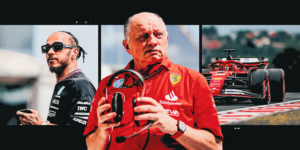Prof Claudia de Rham is a theoretical physicist at Imperial College London, develops and tests “new models and paradigms” at the intersection of gravity, cosmology and particle physics. She has just published her first book, The Beauty of Falling: A Life in Pursuit of Gravitywhich saw her lifelong quest to understand the “true nature” of the force around her, which saw her train as an astronaut, diver and pilot.
In your book you say that you have been “chasing gravity my whole life”. What does it mean?
It’s something we all have within ourselves, this playful relationship with gravity. But to some extent it took on a meaning of its own for me in terms of actually trying to go to outer space, to defy gravity in a slightly different way. And when it didn’t work out, then to do it from a more scientific point of view, in terms of understanding the underlying framework behind the models that we have for gravity; coming up with new models, and finding ways to see if we can experiment with them.
What is it about gravity that you find so compelling?
Gravity is so universal. And I think it’s very fundamental, it’s a phenomenon that affects everything, everyone, all the time, everywhere. It does absolutely everything: it connects everything and everyone. We all experience it in the same way, whether we are a person or a planet, a black hole or a balloon, a hammer, a feather, a piece of cheese or a pumpkin seed. It is something that is within us without us being able to overcome it. The feeling of weightlessness, the feeling of free fall is what gravity is. This is a complete freedom in itself.
You trained as a diver and a pilot to better understand the fundamental forces around us, and at the final selection stage of astronaut training for the European Space Agency. How did that journey begin?
It began to chase gravity, in a sense. For me, that meant going into outer space and experiencing gravity within a different environment, and experiencing this sense of weightlessness on a deeper level. So when I was able to formulate it in my head as a kid, it really became a long-term goal. For such a long period of my life, every single thing I would do was focused on the idea that I wanted to be an astronaut, I wanted to participate in astronaut selection and put myself in the best position for it.
What did astronaut training involve?
We were subjected to a series of tests, most of which were designed to assess our team-based abilities in stressful situations. This included a kamma rescue expedition through the “jungle” – we were asked to plan the risky mission knowing that resources were limited, night was coming, and if we weren’t careful, some of us might not make it back not. Another saw us team up as pretend air traffic controllers in an overcrowded airport, tasked with landing several planes short of fuel. The twist was that each of us only had access to half the information, so we had to engage in precise communication and cooperation with our partner to complete the mission. Out of nearly 10,000 applicants to apply, 99.5% were rejected by the final stage. Only 42 made it to this second training stage.
Your hopes were cut short by the discovery of latent tuberculosis during the final selection round, which you describe as “a little memento I must have unknowingly brought with me from my time in Madagascar” from your childhood. Do you wonder what life could have been like if you hadn’t gotten sick?
I see the candidates going out into space…it’s a dream of course. But at the same time, I don’t regret the path my life has taken since then. I think it opened up other opportunities.
How much more is there to learn about gravity that we don’t already know?
The beauty of gravity as we know it now is that there is much more to learn about it. We know that now Einstein’s theory of general relativity cease to be a consistent and accurate description of what happens in some situations, such as very close to the center of black holes, or the big bang. His theory seems to suggest that we can measure certain physical quantities, such as the curvature of spacetime, which appears to become infinite (we call it singularity), but measuring an infinite value simply wouldn’t make sense. To understand what takes over when his theory is no longer valid, we might want to ask ourselves questions like “what happens at the center of a black hole?” or “what happened at the time of the big bang?” – but if the concepts of space and time no longer make sense, then the questions themselves may not make sense either. We don’t even have the language to phrase the questions we have, much less answer them.
What can gravity tell us about the future?
What we know at the moment is that the expansion of the universe accelerated, which was a surprise 25 years ago. What we need to understand is what causes this accelerated expansion, and whether the laws of gravity we use to describe them are valid. We need to understand it better [understand] what will happen in the future. Will this accelerated expansion continue forever? Will it be accelerated even more? Will it stop? We don’t know, because we don’t even know exactly what the origin of this phenomenon is. The fate of our universe, and the fate of space and time in a certain sense, will therefore depend on what is driving this accelerated expansion of the universe.
Is it frustrating to have so many questions and so few answers?
It’s exciting. It’s small steps. If what you are trying to do is see if there will be an application of your discoveries for tomorrow, then this is not the field for you. But you do learn: you gain a much deeper appreciation of the nature around you, and it’s these everyday small steps that really lead to the biggest steps in the longer term. Every little understanding is a breakthrough in itself because it will allow us to go deeper. In science, even a negative result is a result in itself.
-
The Beauty of Falling: A Life in Pursuit of Gravity by Claudia de Rham is published by Princeton University Press (£20). Around the Guardian and Observer order your copy at guardianbookshop.com. Delivery charges may apply






